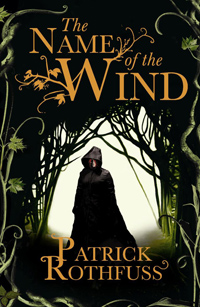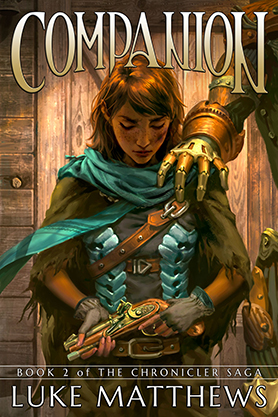Today, I did something I haven’t done in a very long time: completely lost myself in a book.
It’s an interesting thing. My wife and I are both pretty voracious readers, especially since we got Kindles (I’ve got another post in mind about that subject). I read a lot, but lately I haven’t been so deeply ensconced in a book that I feel I have to finish it. I have specific times of day that I read, and it happens like clockwork every evening. It’s been a long time – probably a couple of years ago when I was reading The Dark Tower books – that I was truly driven by a book.
 Last Thursday I started reading The Name Of The Wind by Patrick Rothfuss. It’s a fantasy series that Rothfuss – only a couple of years older than me – took seven years to write, if the anecdotes are to be believed. It took another five for the sequel, the second book in a proposed trilogy, to come out. The book plays with a lot of the tropes of fantasy by setting up a story-within-a-story. It flips between first- and third-person perspective, the third-person narrative taking place in “present day” (in the in-book world) and the first-person parts being told by one of the characters as a chronicle of his life.
Last Thursday I started reading The Name Of The Wind by Patrick Rothfuss. It’s a fantasy series that Rothfuss – only a couple of years older than me – took seven years to write, if the anecdotes are to be believed. It took another five for the sequel, the second book in a proposed trilogy, to come out. The book plays with a lot of the tropes of fantasy by setting up a story-within-a-story. It flips between first- and third-person perspective, the third-person narrative taking place in “present day” (in the in-book world) and the first-person parts being told by one of the characters as a chronicle of his life.
At first, I was taken aback by the switch in narrative style. It’s a hard switch to justify, but Rothfuss handles it with brilliant grace. I was drawn into Kvothe’s story more deeply than I have been engrossed in a book in a long time. As I said, I began reading it last Thursday and only kept it confined to my “normal” reading times. Over the first four days I covered about the first third of the book. Last night, I began reading at 7pm and put the book down when I was fighting to stay awake at 1am. I began reading it again at 8:30 this morning, and was so lost in it that I was startled by my wife coming home at 3:30. I finished the book shortly thereafter.
I’m not writing this blog post as a straight-up review of Rothfuss’s book, but I am going to say that it’s one of my favorite fantasy series in a very long time. I’ve started several new series recently, including The Colfire Trilogy by C.S. Friedman, The First Law Trilogy by Joe Abercrombie, and soon the Long Price Quartet by Daniel Abraham. The Name of the Wind is far and away the best I’ve read so far.
The last few series – especially trilogies – that I’ve read have not turned out well for me. I can’t say much about the Colfire trilogy; The first book actually got on my nerves to a large degree, and I started reading the second more out of sad hopefulness than any real desire. It didn’t turn out well. The Knife Of Never Letting Go was one of the best first books I’d read in a long time, only to have the rest of the series just fall apart piece by piece until I was actually angry at how it ended. And don’t get me started on The Hunger Games.
Now, I’m worried. The Name Of The Wind ranks amongst the best fantasy I’ve read, but my track record with novel series’ leaves me anxious rather than excited. There is hope that it will fulfill the promise of it’s beginnings, but that hope is terribly tinged with desperation… What if it turns out like The Hunger Games? I’ll have to put that notion aside for now and focus on the positives, and hope that Rothfuss can pull through for me.
The other part of this book that’s rough for me is that I’m a writer. Well, a budding one, anyway. Rothfuss’s prose is so well constructed that he makes the simple seem eloquent. As I read his sentences, I think to myself “I know all of these words!” Then Rothfuss arranges them into groupings that simultaneously inspire to new heights as a writer and despair at the thought of ever putting words down for other people to read.
As I finished The Name Of The Wind, I look back on my own manuscript. I’m close to finishing my second draft. I spent months writing the first one, carefully organizing the jumble of Legos that were my notes and constructing a fancy, but flawed, diorama. As I pore over the words, I find bits out of place or poorly constructed, tear them down, and rebuild. The diorama starts coming together in a way that makes you forget about the little round nubs with LEGO etched in their tops.
Then Rothfuss comes in with a 15-foot-tall flawless recreation of Notre Dame, with minifigs in the appropriate places for all of the reliefs, and suddenly my diorama goes back to looking like a semi-organized pile of kid’s toys. So although I absolutley adored this book, I’m now questioning every paragraph of my own. I mean, how come I know all the same words, but can’t seem to get them into the same configurations? Rothfuss’s prose is the kind I aspire to with my own writing: clear, concise, and understandable, and simultaneously thrilling, engrossing, and evocative.
But I guess this is one of the perils of being a writer. There will always be a better writer out there than me (probably tens of thousands, actually), and every time I read their books I’m going to have this same internal struggle.
Maybe this is good, though. I can’t go around thinking I’m good at this shit.

